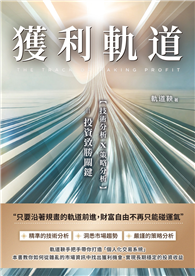Now in its 12th edition, Political Ideologies and the Democratic Ideal continues the tradition of clear, concise and comprehensive explanation to the ideas and ideals that shape our political world. The text defines each ideology in terms of the four functions ideologies perform - explanation, evaluation, orientation, and political program.
| FindBook |
有 1 項符合
Political Ideologies and the Democratic Ideal的圖書 |
 |
Political Ideologies and the Democratic Ideal 出版社:Routledge 出版日期:2024-10-29 語言:英文 規格:精裝 / 464頁 / 普通級/ 初版 |
| 圖書館借閱 |
| 國家圖書館 | 全國圖書書目資訊網 | 國立公共資訊圖書館 | 電子書服務平台 | MetaCat 跨館整合查詢 |
| 臺北市立圖書館 | 新北市立圖書館 | 基隆市公共圖書館 | 桃園市立圖書館 | 新竹縣公共圖書館 |
| 苗栗縣立圖書館 | 臺中市立圖書館 | 彰化縣公共圖書館 | 南投縣文化局 | 雲林縣公共圖書館 |
| 嘉義縣圖書館 | 臺南市立圖書館 | 高雄市立圖書館 | 屏東縣公共圖書館 | 宜蘭縣公共圖書館 |
| 花蓮縣文化局 | 臺東縣文化處 |
|
|
內容簡介
作者簡介
Terence Ball received his Ph.D. from the University of California at Berkeley and is now Emeritus Professor of Political Science and Philosophy at Arizona State University. He taught previously at the University of Minnesota and has held visiting professorships at Oxford University, Cambridge University, and the University of California, San Diego. His books include Transforming Political Discourse (1988), Reappraising Political Theory (1995), and a mystery novel, Rousseau’s Ghost (1998). He has also edited The Federalist (2003), James Madison (2008), Abraham Lincoln: Political Writings and Speeches (2013), and coedited The Cambridge History of Twentieth-Century Political Thought (2003).
Richard Dagger earned his Ph.D. from the University of Minnesota and has taught at Arizona State University and Rhodes College, and the University of Richmond, where he is currently the E. Claiborne Robins Distinguished Chair in the Liberal Arts. He is the author of many publications in political and legal philosophy, including Civic Virtues: Rights, Citizenship, and Republican Liberalism (1997) and Playing Fair: Political Obligation and the Problem of Punishment (2018).
Daniel I. O’Neill received his Ph.D. from the University of California, Los Angeles, and is currently Professor of Political Science at the University of Florida. He is the author of The Burke-Wollstonecraft Debate: Savagery, Civilization, and Democracy (2007); co-editor of Illusion of Consent: Engaging with Carole Pateman (2008); and author, most recently, of Edmund Burke and the Conservative Logic of Empire (2016). From 2017-2023 he co-edited one of the flagship journals of the American Political Science Association, Perspectives on Politics.
Jennet Kirkpatrick holds a Ph.D. from Rutgers University and is now an associate professor in the School of Politics and Global Studies at Arizona State University. She is the author of The Virtues of Exit and Uncivil Disobedience. She has published articles in Political Theory, The Review of Politics, Dissent, Theoria, Politics, Groups, and Identities, Contemporary Political Theory, American Political Thought, and Perspectives on Politics. In addition to her interest in resistance, Professor Kirkpatrick also teaches and writes about morality and politics, and feminist theory.
Public Accountability and Constitutional Law
Computational Political Communication: Theory, Applications, and Interdisciplinary Challenges
Deconstructing the Responsibility to Protect
The Immigrant Superpower
Freedom and Borders: A Theory of Citizenship for the Age of Globalization
Imagining Alternative Worlds: Far-Right Fiction and the Power of Cultural Imaginaries
Imagining Alternative Worlds: Far-Right Fiction and the Power of Cultural Imaginaries
Popular Culture in Hong Kong After the National Security Law, 2020-2022
Accident, Touch, and Privacy: Climate Change and the Unguided Evolution of Humanity
|











